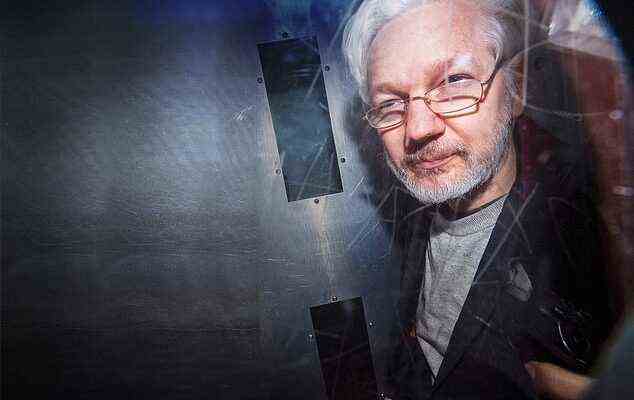The US government has won its High Court bid to extradite WikiLeaks founder Julian Assange.
Assange, 50, is wanted in America over an alleged conspiracy to obtain and disclose national defence information following WikiLeaks’s publication of hundreds of thousands of leaked documents relating to the Afghanistan and Iraq wars.
A US grand jury indicted him on 18 charges last year – 17 of which fall under the Espionage Act.
Assange’s lawyers claim he faces up to 175 years in jail if convicted, while adding that he would be sentenced to a hell-hole US supermax prison.
In January, district judge Vanessa Baraitser that Assange should not be sent to the US, in which she cited a real and ‘oppressive’ risk of suicide.
However, the US government appealed the ruling, insisting it had given diplomatic assurances that Assange would not face those strictest measures either pre-trial or post-conviction. It also suggested that Assange’s sentence will probably be between four and six years.
After a two-day hearing in October, the Lord Chief Justice Lord Burnett, sitting with Lord Justice Holroyde, ruled in favour of the US on Friday.
The case will now be sent to Priti Patel who will make the final decision on Assange’s extradition, though he is expected to appeal today’s ruling. His father Richard has previously said that they would take the legal battle all the way to the Supreme Court if necessary.
He was supported at court today by his fiancee Stella Morris, the lawyer who he secretly fathered two children with while she helped fight against his extradition.
Speaking afterwards, she said: ‘We will appeal this decision at the earliest possible moment. How can it be fair, how can it be right, how can it be possible, to extradite Julian to the very country which plotted to kill him?’
Julian Assange, 50, is wanted in America over an alleged conspiracy to obtain and disclose national defence information
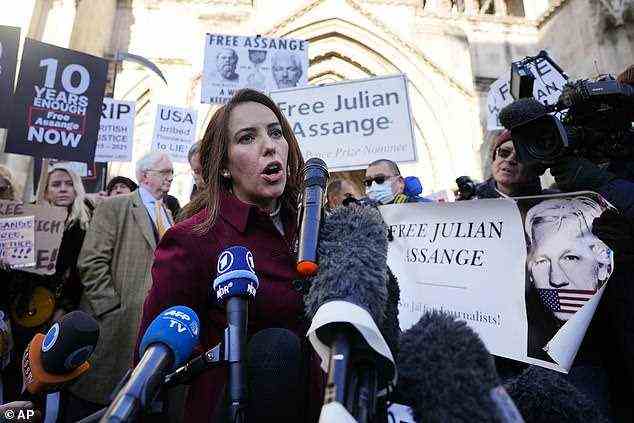
Stella Moris, partner of Julian Assange, speaks to journalists in front of the High Court after the ruling
She added: ‘I want to emphasise that the High Court accepted all the medical evidence and the conclusions of the magistrate that if Julian is extradited and placed under extreme conditions of isolation it will drive him to take his own life, that extradition is oppressive.
‘They incorporate the possibility of breaking those assurances in their very wording.
‘Today, it’s been almost a year since I stood outside court with our victory of the blocking of the extradition.
‘To have… the foremost publisher, journalist, of the past 50 years in a UK prison, accused of publishing the truth about war crimes, about CIA kill teams.’
South African-born lawyer Ms Morris fell in love with the controversial WikiLeaks founder five years ago while visiting him to work on a legal bid to halt the extraditions. The couple have been engaged since 2017.
Ms Morris and Julian had children Gabriel, 3, and Max, one, while he was holed up in the Ecuadorian embassy in London, keeping their relationship and family a secret from the outside world until last September.
The senior judges found that the previous judge had based her decision on the risk of Assange being held in highly restrictive prison conditions if extradited.
However, the US authorities later gave assurances that Assange would not face those strictest measures either pre-trial or post-conviction unless he committed an act in the future that required them.
Lord Burnett said: ‘That risk is in our judgment excluded by the assurances which are offered. It follows that we are satisfied that, if the assurances had been before the judge, she would have answered the relevant question differently.’
He added: ‘That conclusion is sufficient to determine this appeal in the USA’s favour.’
Lord Justice Holyrode said today: ‘For the reasons given in the judgement which is today handed down, the court allowed the appeal on the grounds that the district judge, having decided that the threshold for discharge under Section 9 of the Extradition Act 2003 was met, ought to have notified the USA of her provisional view, to afford it the opportunity to offer assurances to the court.
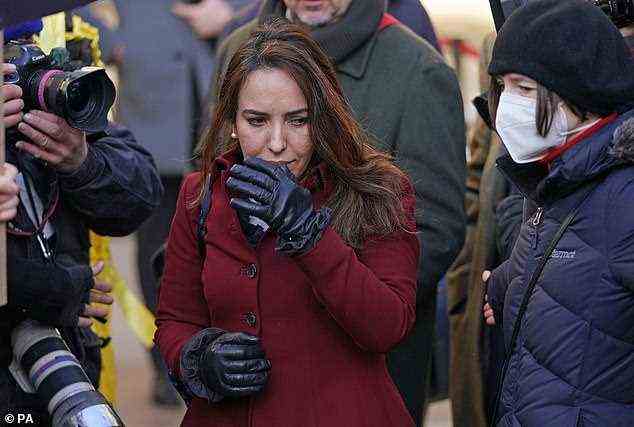
An emotional Ms Morris said outside court: ‘We will appeal this decision at the earliest possible moment. How can it be fair, how can it be right, how can it be possible, to extradite Julian to the very country which plotted to kill him?’
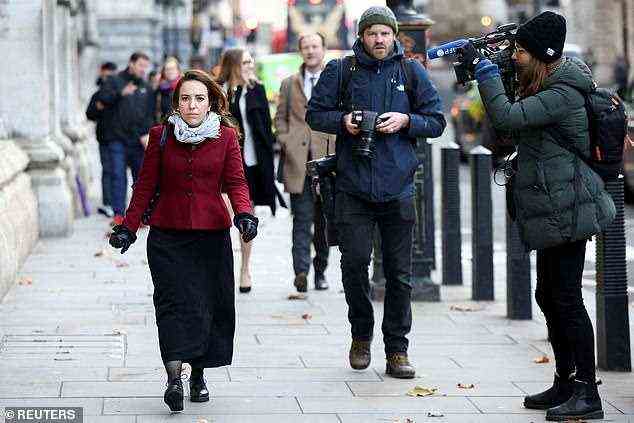
Stella Morris, partner of Wikileaks founder Julian Assange, arrives at the Royal Courts of Justice following the appeal against Assange’s extradition in London
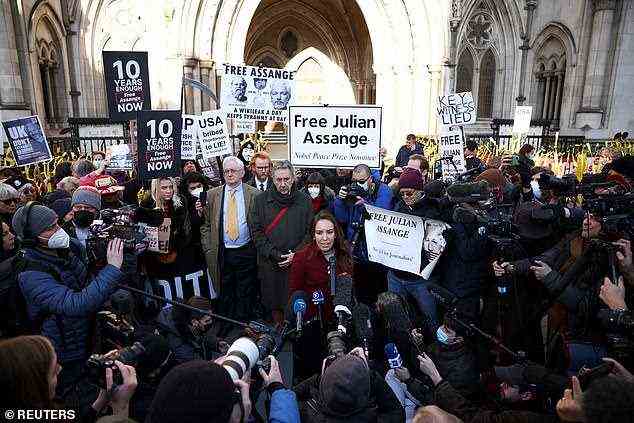
Supporters of Assange join his partner Ms Morris outside the High Court following the ruling
‘The USA has now provided the United Kingdom with a package of assurances which respond to the DJ’s specific findings.’
The journalist’s friends watched the handing down of the decision and left the court in silence.
In a statement following the High Court’s ruling, WikiLeaks editor-in-chief Kristinn Hrafnsson said, ‘Julian’s life is once more under grave threat, and so is the right of journalists to publish material that governments and corporations find inconvenient.
‘This is about the right of a free press to publish without being threatened by a bullying superpower.’
The High Court was previously told that blocking Assange’s removal due to his mental health risks ‘rewarding fugitives for their flight’.
The charges against Assange relate to the 2010 release by WikiLeaks of 500,000 secret files detailing aspects of military campaigns in Afghanistan and Iraq and secret cables about Guantanamo Bay.
This included the notorious ‘Collateral Murder’ video, which showed the July 2007 killing by an American Apache helicopter crew of eleven civilians, including Reuters journalists Namir Noor-Eldeen, 22, and Saeed Chmagh, 40.
The video, recorded by the helicopter gunsight, showed the helicopter crew firing into a group of Iraqi civilian men in New Baghdad after being given permission from a commanding officer, killing 11 men and seriously wounding two children.
James Lewis QC, for the US, said the district judge based her decision on Assange’s ‘intellectual ability to circumvent suicide preventative measures’, which risked becoming a ‘trump card’ for anyone who wanted to oppose their extradition regardless of any resources the other state might have.
Mr Lewis said that the four ‘binding’ diplomatic assurances made were a ‘solemn matter’ and ‘are not dished out like smarties’.
These included that Assange would not be submitted to special administrative measures (SAMs) and detained at the ADX Florence Supermax jail if extradited and that the US would consent to Assange being transferred to Australia to serve any prison sentence he may be given.
The US authorities also argued Assange is well enough to be extradited, with Mr Lewis telling the court his mental illness ‘does not even come close’ to being severe enough to prevent being sent overseas.
But lawyers representing Assange, who opposed the US’s bid to overturn the extradition block, had argued that the assurances over the WikiLeaks founder’s potential treatment were ‘meaningless’ and ‘vague’.
Edward Fitzgerald QC said the judge had produced a ‘carefully considered and fully reasoned judgment’, adding it was ‘clear’ she had ‘scrupulously applied the test for oppression in cases of mental disorder’.
Mr Fitzgerald later said that assurances not to impose SAMs on Assange or hold him at the ADX Florence Supermax jail pre-trial or post-conviction do not remove the risk of ‘conditions of administrative isolation’.
The court also heard that Assange had faced a ‘menacing, threatening and frightening’ situation while under surveillance when he lived at the Ecuadorian embassy in London.
Mr Fitzgerald argued in written submissions that claims of ‘extreme measures of surveillance’, alongside subsequent ‘recent disclosures about CIA plans from the same period in time to seriously harm Julian Assange’, justified earlier concerns for the safety and privacy of his partner Stella Moris.
Assange has been held in Belmarsh Prison since 2019 after he was carried out of the Ecuadorian embassy by police before being arrested for breaching his bail conditions.
He had entered the building in 2012 to avoid extradition to Sweden to face sex offence allegations, which he has always denied and were eventually dropped.
James Lewis QC, for the US, previously told the Court of Appeal it should grant the extradition as the US government has given diplomatic assurances about Assange’s treatment that fundamentally alter the nature of the case.
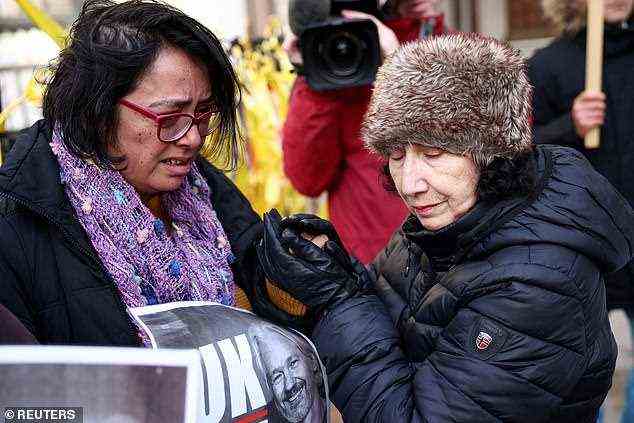
Supporters of Julian Assange comfort each other, outside the Royal Courts of Justice in London
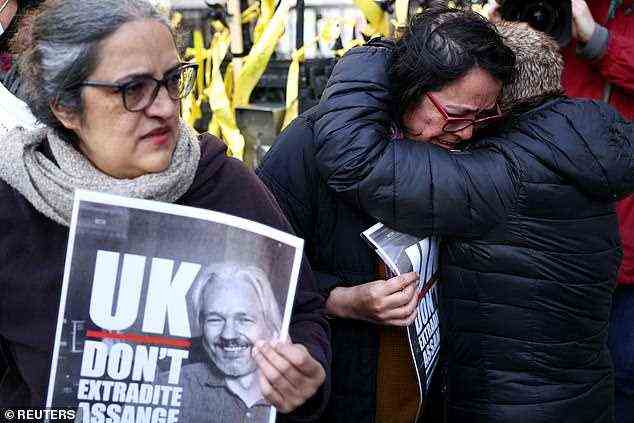
It is expected that Assange will attempt to bring an appeal over this latest decision
He also criticised Professor Michael Kopelman for not revealing Assange was in a relationship with Stella Morris when he first gave evidence about Assange’s mental state last year.
In the judgement today, Lord Chief Justice Ian Burnett said: ‘With all respect to the judge, we cannot agree with her implicit finding that Professor Kopelman’s failings could be excused or overlooked merely because his conduct could be viewed as ‘an understandable human response’.
‘Many people mislead courts for reasons which might be understandable but that does not excuse the behaviour and we it is incompatible with the obligations of an expert witness to do so.
‘Nor was it relevant to the judge’s assessment of his evidence that she had learned of Mr Assange’s relationship with Ms Moriss before she read the medical evidence: it was no thanks to Professor Kopelman that she had done so.’

